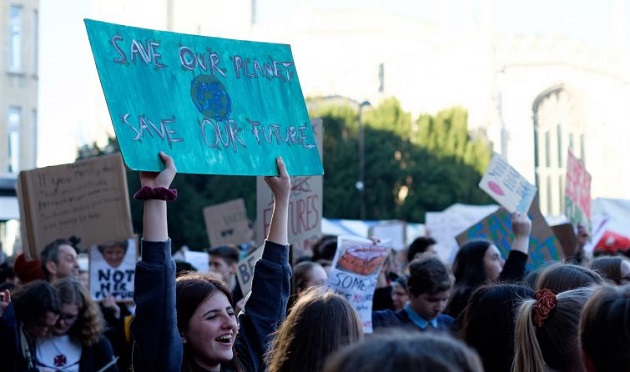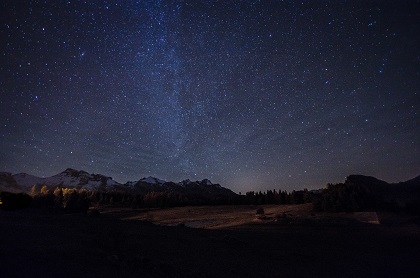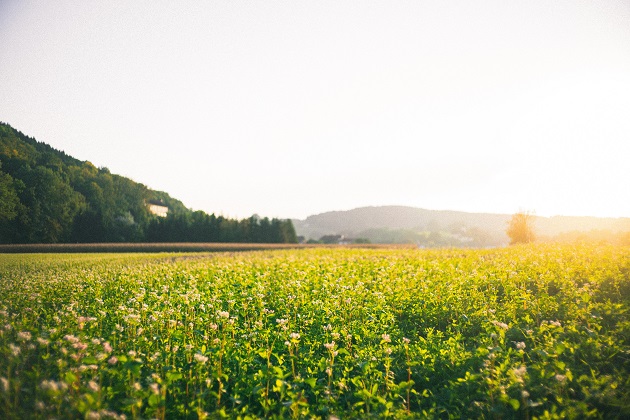Perhaps we are being offered a wake-up call and a hope. And perhaps we can bring a humble, rich theology of creation (one that spurs us into action) squarely into the debate.
 Youth strikes for climate happened across the country on 15th Feb 2019, including the strike pictured in Cambridge. / Photo: Alexander Welbourne, Instagram @alexanderwelbourne
Youth strikes for climate happened across the country on 15th Feb 2019, including the strike pictured in Cambridge. / Photo: Alexander Welbourne, Instagram @alexanderwelbourne
The last few months have been significant for youth environmental activism. Inspired by sixteen-year-old activist Greta Thunberg, tens of thousands of schoolchildren across the world have been striking from school in protest over climate change.
This is not an exaggeration; in the February 15th strikes (according to the protest organisers) there were an estimated 31,000 young people striking in the UK and Germany alone. The movement is spreading to places as diverse as Japan, Colombia and Thailand. Another global schools’ strike is being coordinated for 15th March, and if the gathering momentum since last November is any indication, it’s going to be a big one.
With boldness and passion, young people are protesting for a change in environmental policy and education. In the UK there are four demands being made by students:
1. The government should declare a ‘climate emergency’
2. It should also inform the public about the seriousness of the situation
3. The national curriculum should be reformed to include ‘the ecological crisis’
4. The age of voting should be lowered to 16 so younger people can be involved in decision-making around environmental issues.
If you’re wondering where this conviction comes from, and whether to affirm it as Christians, there is (as ever) wisdom to be sought in the Bible. Let’s take a moment to sit with scripture and listen for its wisdom on the relationship between mankind, creation and God, before returning to consider the youth strikes.
WALKING THROUGH PSALM 8
For now, will you walk slowly with me through Psalm 8? This might feel a little different to how we usually do things on the Jubilee Centre blog, but we’re going to take an imaginative walk through the psalm. In many ways, Psalm 8 considers the ‘Creation Mandate’ (Genesis 1:28) and re-works it through the eyes of an individual, the psalmist. It lets us feel the emotional weight of our place in creation, and as such, can bring fresh revelation.
Let’s start by pausing, breathing deeply and starting to think—not of yourself, but of the earth. You picture in your mind’s eye geysers and glaciers, foxes and rainforests, blue skies and orange deserts. And you consider the one who made it—this tremendous diversity and colour and life—and think: Lord, our Lord, how majestic is your name in all the earth! (Ps. 8.1)
 Photo: Quentin Dr (Unsplash, CC0)
Photo: Quentin Dr (Unsplash, CC0)Then, imagine you’re in a field. Your boots stick in the mud, there’s a chill in the air and the night sky is splashed above you. It’s cloudless and dark, so you can see clearly that the sky is purple with galaxies and packed full of stars. You tip your head back, to take it all in (though you can’t see it all, there’s too much to see) and you look deep in wonder. You have set your glory in the heavens. (Ps. 8.1) When I consider your heavens, the work of your fingers, the moon and the stars, which you have set in place… (Ps. 8.3)
And you see the distance and you remember the science. That the light of the stars has travelled billions of miles in distance and thousands of years in time. And you’re aware of your limited self, in a frail human body, next to the scale that you’re seeing. The scale that tells you something of God. What is mankind that you are mindful of them, human beings that you care for them? (Ps. 8.4)
And though the heavens are glorious, you—a small, fleshy human—are glorious too. Standing there in your boots, holding back a shiver, you’re a special reflection; you’re bearing God’s image. How is that possible? You have made them a little lower than the angels and crowned them with glory and honour. (Ps. 8.5)
Then you look down at the things set under your feet and it’s staggering. God gave you every seed bearing plant (ripe cherry tomatoes and blossoming apple trees) and made you a king to work on the earth. You made them rulers over the works of your hands; you put everything under their feet. (Ps. 8.6)
And you glance at the sea and you remember all the images you’ve ever seen of the swarming, deep blue and the life swimming inside it—diverse and rich and plentiful. Somehow, everything of his is under your feet. All that swim the paths of the seas. (Ps. 8.8)
And finally you end up where you started. You return to that opening thought of all the earth proclaiming the glory of God and you, we, humanity standing there—in the midst of it. Lord, our Lord, how majestic is your name in all the earth! (Ps. 8.9)
THE WEIGHT OF RESPONSIBILITY AND PSALM 8
Although verses 6-7 (which speak of the glory and rule of human beings) are often pulled out of context, they lose their richness without the whole psalm’s context. What becomes evident, when moving through the psalm’s structure is the deep posture of humility and wonder held by the psalmist. Looking up at the glory of the sky, and down and the teeming life of the earth, the psalmist sees the glory of the created world belonging to God and humbly wonders at his position in it. The bookends, the words that open and close the psalm, are profoundly God-centred (as any theology of the environment should be), proclaiming ‘how majestic is your name in all the earth’. It’s no simple (or inconsequential) thing to be given responsibility for this created, material world which reflects the Creator’s glory.
Turning then, to the schools strikes, I wonder whether the urgency and conviction of the youth protests offer a witness into what it looks like to take our weighty responsibilities for creation seriously. If we had a theology that really embraced a rich and meaningful relationship between God, creation and man (one that said our Lord, whose name is majestic in all the earth) then surely we would be equally stirred by the loss of biodiversity, the changing climate and the unsustainable use of land and resources.
 Photo: Jorg Bauer (Unsplash, CC0)
Photo: Jorg Bauer (Unsplash, CC0)Whatever you make of the eventual policy solutions, the youth strike’s call to declare a climate emergency—to take the situation seriously—is heartening. In many ways, the youth protesters are readily taking-up a God-given responsibility that has been neglected by the generation before them. Which brings us to a verse that we didn’t consider in our devotional reading. Psalm 8:2 declares: Through the praise of children and infants you have established a stronghold against your enemies… In many ways, it seems out of place in the psalm, a nod to the upside-down logic of strength flowing from the praise of children. It’s a reminder that God uses the weakest to confound us. But it also offers a reminder of the miracle of generations: that the young succeed the old with the promise of a new generation born into creation. At the end of the day, poor stewardship of the environment is an inter-generational injustice. In the rising youth climate movement, we see a reminder that we have broken faith with our children and their children. Perhaps we are being offered a wake-up call and a hope. And perhaps we can bring a humble, rich theology of creation (one that spurs us into action) squarely into the debate.
Charlee New, Communications and Marketing Officer at the Jubilee Centre.
This article first appeared on the Jubilee Centre website and was republished with permission.

Las opiniones vertidas por nuestros colaboradores se realizan a nivel personal, pudiendo coincidir o no con la postura de la dirección de Protestante Digital.
Si quieres comentar o